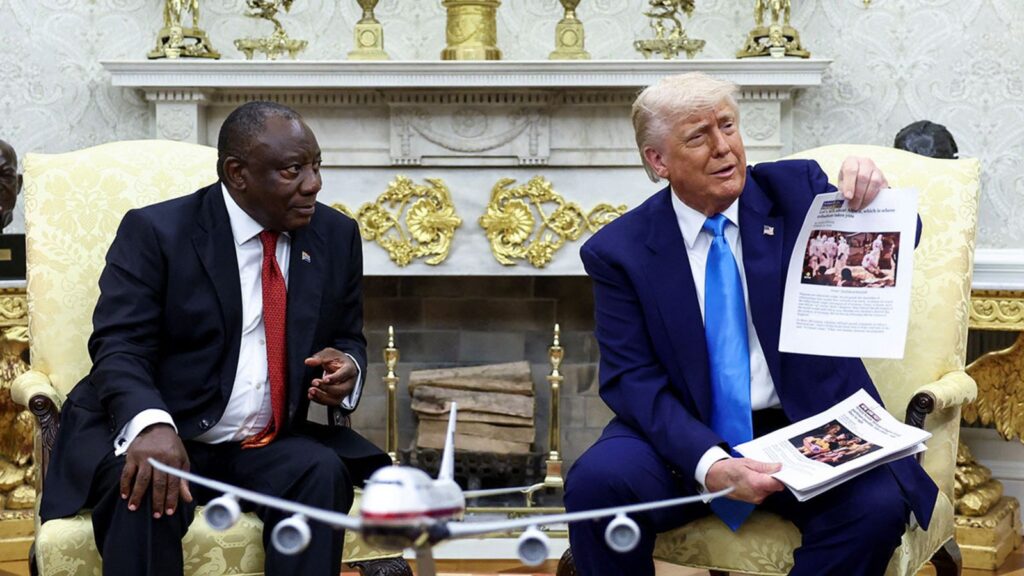Trump’s Unexpected Confrontation with Ramaphosa Sparks Division in South Africa
In a pivotal moment recently, former U.S. President Donald Trump confronted South African President Cyril Ramaphosa during an Oval Office meeting, raising tensions between right-wing Afrikaner groups and the broader South African populace. Trump’s criticism of South African policies has been both provocative and celebrated by certain factions in South Africa, particularly among the Afrikaner right.
Trump’s Bold Claims Received with Varied Reactions
The confrontation focused on Trump’s assertions regarding the alleged persecution of Afrikaners, spurring quick admiration from organizations like the Solidarity Movement, which had previously lobbied in Washington. Ernst Roets, a prominent Afrikaner advocate, lauded Trump for “making history” during the meeting, while others in the movement claimed he deserved accolades such as a Nobel Prize for elevating the so-called “farm murder crisis” onto the global stage.
However, not everyone in South Africa shares this enthusiasm. Critics argue that these right-wing groups have demonstrated a lack of national pride by seeking external intervention in local matters, particularly when the country is governed by a coalition aimed at addressing issues affecting all demographics.
Reactions to the Meeting
While Trump made his case, Ramaphosa remained composed amid the storm, earning praise from many for his diplomatic handling of the situation. South Africans noted the example of inclusiveness represented by Ramaphosa’s delegation, which included prominent politicians from diverse backgrounds, including John Steenhuisen, a key leader in the opposition Democratic Alliance party.
Steenhuisen emphasized that the government was striving to tackle crime without discrimination, dismissing assertions that white farmers were largely fleeing the country as misguided. “Most farmers are determined to make their lives work here,” he stated.
Understanding the Context of the Confrontation
Trump’s display perhaps unintentionally amplified attention on the radical elements within South African politics, particularly the Economic Freedom Fighters (EFF) led by Julius Malema. His provocative performances, including chanting the song “Shoot the Boer,” have raised alarm among various communities. However, South Africa’s judiciary ruled that such expressions should not be interpreted as direct calls to violence.
Ramaphosa argued that despite opposing Malema’s rhetoric, the EFF has the constitutional right to exist as a political entity. “We are a democratic nation,” he reminded Trump, urging a focus on unity rather than division.
Table: Key Points from Trump-Ramaphosa Meeting
| Aspect | Details |
|---|---|
| Participants | Donald Trump, Cyril Ramaphosa, John Steenhuisen |
| Main Claim | Allegations of Afrikaner persecution |
| Reactions from Afrikaners | Celebration from right-wing groups, concern from moderates |
| Counterarguments | Focus on crime, not race; government unity |
Conclusion and Broader Implications
The dynamics exhibited during the Trump-Ramaphosa meeting reveal a deep-seated division within South Africa regarding race and governance. While Ramaphosa’s emphasis on unity and inclusiveness mirrors the visions of South Africa’s post-apartheid leaders, the allure of populist rhetoric from figures like Trump and Malema continues to resonate among particular segments of the population, leading to an increasingly polarized national discourse.
As South Africans digest the implications of this encounter, the nation remains at a crossroads, grappling with its tumultuous history while navigating the complexities of modern governance.


